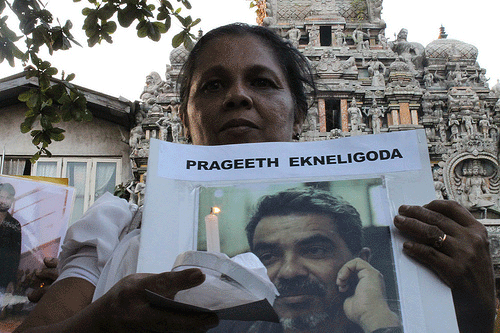
To date, no credible investigation into the disappearance of Prageeth Eknaligoda has taken place. Prageeth Eknaligoda disappeared on 24th January 2010 and to this day there has been no credible investigation into his disappearance, despite many interventions by the United Nations Human Rights agencies, other international organizations, and by local Sri Lankan organizations. The wife of Prageeth Eknaligoda, Mrs. Sandya Eknaligoda, while participating in an international conference in London, told the BBC Sinhala Service that she has attended court on over 50 occasions to appear in the inquiry into the habeas corpus application filed by her, and that the case has been dragged-on, primarily due to police witnesses failing to appear in court. She reportedly said that she cannot even guess how long the case will be made to drag-on in this manner, and that it is not possible to expect justice for this disappearance from Sri Lanka courts.
Her complaint about the case being made to drag-on in such a manner, the police witnesses absconding the proceedings, and the impossibility of predicting how long the case will go on, will not surprise anyone in Sri Lanka. Delays and space for all kinds of manipulations to sabotage justice are inbuilt characteristics of the so-called justice system in Sri Lanka. Even the United Nations Human Rights Committee has commented on this issue, in their opinions on several communications that have come before the UNHR Committee. In fact, the UNHR Committee has made several recommendations to the Sri Lankan government in order to correct this situation. However, the Sri Lankan government treats delays and unscrupulous maneuvering of the system as incorrigible aspects of the “local system of justice”.
This is even truer in cases relating to enforced disappearance. It may be stated without hesitation that sabotaging all attempts to obtain justice by the families of the disappeared persons is an entrenched policy of the government. All government agencies involved in the process of delivering justice, such as the police, the attorney general’s department, and the judiciary itself have demonstrated an impenetrable resistance to all such attempts to seek justice in cases of persons alleged to have been subjected to enforced disappearance.
The reasons for such hard policy to deny justice to the survivors in the families of the disappeared is not surprising, as the primary suspects for causing these disappearances are none other than the government agencies, such as the police, the military and other paramilitary agencies, or others deployed by the government.
For example, in the case of Prageeth Eknaligoda, the allegation by his family, and even some of the newspapers that have reported on the issue of his disappearance, is that a powerful politician of the ruling regime is behind his disappearance. In fact for several years, Prageeth Eknaligoda’s disappearance has been a major embarrassment for the Rajapaksa regime. The government’s campaign to undermine the allegations against it arose from the highest levels. Take, for instance, the words of the present Chief Justice Mohan Peiris, who, when participating at the last sessions of the United Nations Committee Against Torture on 9th November 2011, officially stated to the Committee that he was aware that Prageeth Eknaligoda was living in a foreign country. He reneged on these words when later questioned in a Court of law. However, despite such constant embarrassments faced at international fora, the government has done nothing to exonerate itself from any of the allegations by ensuring a credible inquiry.
It is unfortunate that the media interest in the disappearance case of Prageeth Eknaligoda was diverted into controversies about the claims that his disappearance came about due to his journalistic involvements. The issue whether he was a journalist, or whether the cause for his disappearance was his journalism, became the focal point of media controversy. This happened despite virtual unanimity in suspicion of the government’s involvement in his disappearance.
In public debates in Sri Lanka, enforced disappearances have not been considered as a heinous crime. There has not been a serious media campaign to force the government to ratify the International Convention for the Protection of All Persons from Enforced Disappearance. Though some human rights organizations have, from time to time, raised the issue, there has not been a sustained attempt to generate a political opinion to support such ratification and to demand from the government a clear expression of its point of view to criminalize enforced disappearances. Presently, no prosecution is possible on the basis of an enforced disappearance alone. As it was demonstrated in the infamous Embilipitiya case involving the disappearance of children, the only recourse in such a situation is to bring a charge of abduction, a lesser crime.
Particularly among the more sophisticated groups in Sri Lanka, which includes the legal community, there lurks a belief that, under certain circumstances, causing of enforced disappearances is a legitimate option for a government. Despite mouthing words of pious commitment against enforced disappearances in public fora, the Rajapaksa regime’s firm position on enforced disappearance is that it is permissible under certain circumstances. In fact, the threat of causing an enforced disappearance has been used as a potent weapon to intimidate government opponents.
Recently, journalists and lawyers held demonstrations to protest attacks and imminent threats of attack as a reprisal against their engagement in their respective professions. The underlying fear of extrajudicial killings, which includes possible enforced disappearances, is quite common among all those who take an active part in fighting for the rights of the people.
Under these circumstances, it should be an essential part of a strategy for the defense of people’s rights to develop a consensus against the causing of enforced disappearances.
The lack of this consensus acts in favour of the government’s repressive agenda.